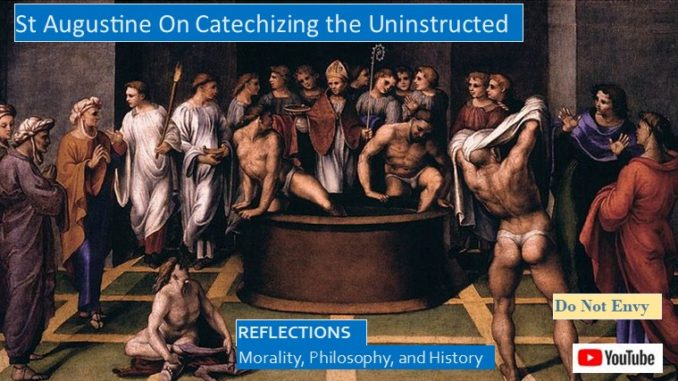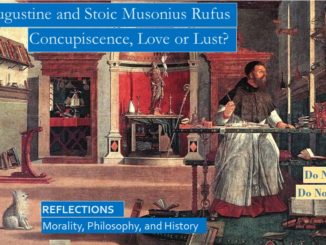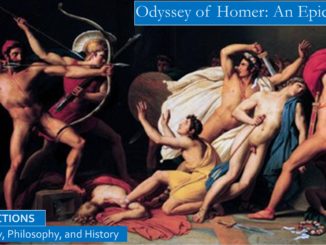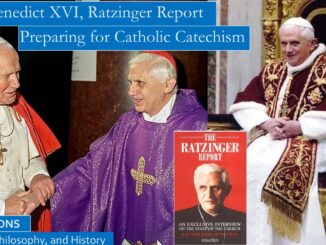
St Augustine, in this section of Catechizing the Uninstructed, includes a suggested homily to catechumens that his deacon can modify to fit his needs. The discourse starts by asking, How can we find the “tranquility and security from the great and dangerous storms of this world?” We could seek security from wealth, but “the man that seeks security from wealth is rendered proud rather than at ease.” We could seek honors from this world, but both wealth and honor could disappear in an instant. Likewise, we should not seek pleasure in riches and “dainty meats and fornications,” for the pleasures of this world bring only false happiness and harm to our soul. Rather than trust in “mortal and transitory things, we should fix our attention on the eternal Word of the Lord, so we can cleave to that which endures forever.”
If you seek to become a Christian for social or temporal reasons you may backslide from the faith when you see “wicked and impious men” who are more prosperous than you are. You may ask yourself, How is this faith helping me? This is the wrong question, for the true Christian seeks “everlasting blessedness and the perpetual rest of the saints so he may not pass into eternal fire with the devil but rather enter into the Eternal Kingdom together with Christ. He will be on his guard in every temptation, so we will neither be corrupted by prosperity nor be utterly broken in spirit by adversity, but remain modest and temperate during good times, and be brave and patient during times of tribulation.” Then this Christian will “Love God more than he fears hell,” and he will recoil from evil thoughts and temptations.
See blog 1: http://www.seekingvirtueandwisdom.com/st-augustine-on-catechizing-the-uninstructed-blog-1/
YouTube script for this blog: https://youtu.be/5Ys5lAhADg8
The best electronic version of Nicene and Post-Nicene Fathers, Series 1, Volume 3, containing this work, is at: https://www.christianbook.com
St Augustine teaches, “We ought to Love God who has so loved us to send His only Son, so he may humble Himself with the lowliness of our mortality, and die at the hands of and on behalf of sinners.” “God is the most merciful and patient with ungodly men, and offers them penance and amendment.”
Then St Augustine recounts the history of the Church, the rescue of Israel from bondage in Egypt, the wood of the rod of Moses parting the waters of the Red Sea prefiguring the wood of the cross, the righteous passing through the walled-up waters which then fell upon the chariots of the Pharaoh prefiguring the waters of “baptism, by which the faithful pass into new life, while their sins are done away with like enemies, and perish.” Likewise, “the passion of Christ was prefigured when the Israelites were commanded to slay and eat the lamb, and to mark their doorposts with its blood,” so the angel of death would pass over the houses of the Israelites. This smearing of the blood of the lamb prophecies the death of the Lord Jesus Christ, “who was led like a Lamb to the slaughter.” When they were given the Decalogue, when the Isrealites “received the Law written on stone by the finger of God, the stone signifies the hardness of their heart when they were not able to fulfill the Law.”
The discourse relates the six ages of the World, the ages of Adam, Abraham, King David, the Babylonian captivity, the age starting from the return from Babylon, and the sixth age of the coming of Christ into the world. “In this sixth age the mind of man may be renewed after the image of God, even as on the sixth day man was made after the image of God.” In this sixth age the law was fulfilled, Christ was born of a “mother who conceived without being touched by man, in virginity conceiving, in virginity giving birth, in virginity dying, but who had nevertheless been espoused to the Holy Spirit, extinguishing the flame of carnal nobility.” Christ was born in the lowly village of Bethlehem, born poor so believers may not boast of earthly riches. Christ refused to be made by men a king, so He in His humility conquer the pride that separated man from God, yet He is King of an everlasting Kingdom. He who was hungry and thirsty feeds all men and quenches the thirst of all men.
The commandments of the Decalogue were “reduced to two, the we should Love God with all our heart, and with all our soul, and with all our mind, and that we should love our neighbor as ourselves, on these two commandments hang all the law and the prophets, as the Lord Himself declared in the Gospel and in His own example.” The fifty days from Passover to the day the Lord wrote the Decalogue on the rock of the tablets prefigures the fifty days from the passion and resurrection of the Lord at Pentecost, when the Holy Spirit descended in a violent wind from Heaven, appearing as flames on the Apostles, giving them the power to speak in the languages of those who heard the Gospel, the Good News of Salvation.
MAKING OFFERINGS FOR THE POOR AMONG THEM
The discourse reminds us that the early Christians did not seek to join the Church for temporal benefits, but rather the early Christians sought “in immortal fashion to Love Christ, who in mortal fashion” suffered Crucifixion and death “on their behalf at their own hands, giving them the gift of forgiveness for all their sins.” Ardent in their Love for Christ, “they sold all they had, laying the price of their possessions at the feet of the apostles, so they may be distributed among them according to their need; and living in Christian love harmoniously with one another, they did not claim to own anything, but held all things in common, and were one in soul and heart toward God.”
The discourse tells us that St Paul was able to reach this level of perfection in his later Christian communities, and since the later Christians “could not readily serve God by selling and distributing their possessions, they instead should make offerings for the poor brethren among the saints of the churches of Judea which had believed in Christ.” Thus charity for the poor was important to the early Church, an emphasis that has been diminished or lost entirely in many churches today.
The final section of the discourse to the catechumens quotes the Gospel, “not everyone who says Lord, Lord shall enter the Kingdom of Heaven, but he that does the will of my Father.” Do not worry about the bad example of those who do not follow the will of Father but have prosperity and honor in this world, “for it is not according to their opinion but according to His truth that you will be judged. Associate with the good, whom you perceive to be at one with you in Loving your King.” “It is one thing to love man, and another to set one’s hope in man; and the difference is so great that God urges us to love our neighbor but forbids us to put our hope in man.” “Be humble towards God, so He will not permit you to be tempted beyond your strength.”
Here St Augustine advises his deacon that as soon as he has delivered this homily to the catechumen, he should be “asked whether he believes these truths and earnestly desires to observe them.” True belief leads us to change our lives.
Here we are warned of the common traps many new (and old) Christians fall into. The first trap is not knowing how to properly read the Scriptures. If you read a section in the Scriptures that appears to conflict with the Love of God, “the love of eternity, and of truth and sanctity, and the love of your neighbor, you should read that section of Scripture figuratively,” as a parable relating some truth, you should endeavor to understand that section of Scripture in a way that increases in your heart your Love of God and your love of your neighbor.
Furthermore, you should not see your neighbor in a carnal manner, but rather see the dignity and humanity in your neighbor, so you can gently water the good mustard seed in his soul, so all whom you meet are slightly better people because you were in their lives. And finally, you should not lose patience with the sinner who lives only because of the patience of God, praying that he may one day be persuaded to repentance.
FINAL DISCOURSE ADDRESSED TO INQUIRERS INTO THE FAITH
In this final section St Augustine suggests a short talk the deacon can give to potential converts who are investigating the faith. It is a shorter version of the discourse to the catechumens, we will quote some highlights and interesting passages. This discourse begins, “all visible things will pass away, and all the pomp and please and solicitude of this world will perish, dragging those who love these pleasures down to destruction. The merciful God, willing to deliver men from this destruction and torment, hindered by sinners who are their own worst enemies, who resist the mercy of their Creator, sent His only-begotten Son, His Word, equal to Himself, by whom He made all things,” to suffer and die for the their sins.
This discourse describes the ark that carried Noah and his family and pairs of animals as “the sacramental sign of the Church that was to be, which at present is floating on the waves of the world, and is delivered from submersion by the wood of the cross of Christ.”
Once again St Augustine links temptation to covetousness to pride and all the other sins against our neighbor. “Believe these truths, and be on your guard against temptations, so that not only will the adversary fail to seduce with helped by those outside the Church, but also that you may decline to follow the bad example of those within the Church who lead an evil life, indulging in the excesses of food and drink and unchastity, or living in the pomp and inflated arrogance of covetousness and pride, or be pursuing any sort of life that the law condemns and punishes.”
“Follow the example of good men, bear with the wicked, love all men,” for you do not know who tomorrow will repent of their evil so they can live the rest of their lives as godly men. “Do not love unrighteousness, but love the unrighteous so they may notice your righteousness, for not only are you commanded to Love God, but also to love your neighbor.”
“Works of mercy and pious humility” remind us of the promise of God, “that He will not suffer his servants to be tempted more than they are able to bear.” [1]
[1] St Augustine, “On the Catechizing of the Uninstructed,” In the Nicene and Post-Nicene Fathers, First Series, Volume 3, translated by Rev SDF Salmond (Boston: Hendrickson Publishers, 1994, first published 1887), p. 300-314.




1 Trackback / Pingback